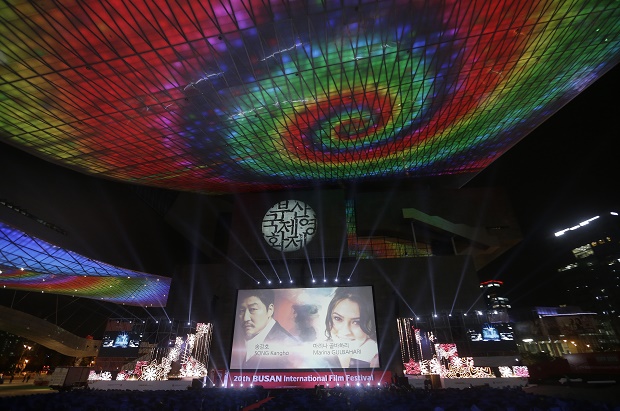Stars align for launch of Asia’s largest film festival

A screen shows Afghanistan actress Marina Golbahari, right, and South Korean actor Song Kang-ho on the eve of the opening ceremony of the Busan International Film Festival at Busan Cinema Center in Busan, South Korea. Wednesday, Sept. 30, 2015. Asia’s largest movie festival kicks off Thursday at a time when the region’s influence on the global movie industry is on the rise. AP Photo
BUSAN, South Korea—Stars from Asia and beyond gathered in South Korea’s second largest city on Thursday for a Bollywood-flavored launch of the 20th Busan International Film Festival.
The event styles itself as the most influential of its kind in a region enjoying stellar growth in box-office receipts and increasing clout in the global movie market.
BIFF’s founding mission was to celebrate the global reach of cinema and champion the cause of the industry in Asia, and Thursday’s opening ceremony at the sprawling Busan Cinema Center was aimed at reflecting its success in reaching those goals.
The main feature is the world premiere of debut Indian director Mozez Singh’s “Zubaan”—a coming-of-age drama about a young Sikh musician and the first time a Bollywood offering has opened BIFF.
Hosting duties for the opening ceremony will be shared between South Korean actor Song Kang-Ho and Afghan actress Marina Golbahari.
Joining them on the red carpet will be a pack of Asian cinema heavyweights, including Chinese actress Tang Wei, Masami Nagasawa from Japan, and Taiwan’s Chang Chen.
Among the international guests attending the October 1-10 event are Hollywood veteran Harvey Keitel, British actress Tilda Swinton and France’s Sophie Marceau.
BIFF has been credited with nurturing the careers of numerous Asian filmmakers and some of them will be on hand for the 20th anniversary event, including Chinese directors Jia Zhangke and Feng Xiaogang, and Taiwanese auteur Tsai Ming-Liang.
“We hope BIFF will continue to grow as Asia’s most celebrated and historic film festival for the 20 years to come,” festival co-director Kang Soo-Yeon told AFP.
With the remnants of Typhoon Dujuan hovering overhead, workers toiled overnight to prepare both the Busan Cinema Center and the city’s Haeundae beach, where many of the festival’s events are held.
These include “Open Talks” with the stars and, for the first time this year, a “Casting Board” event aimed at introducing up-and-coming Asian acting talent to international filmmakers.
Singh said he felt “extremely humbled” that his film was given the opportunity to open the festival on its 20th birthday.
“This is a super platform for any filmmaker and I wish all of us luck and the opening of many exciting new cinematic doors,” he said.
This year’s BIFF will screen 304 movies from 75 countries, including 94 world premieres, a number of them produced by the rising stars of Asian cinema.
Films already being heralded as Oscar contenders are also spread around the festival’s various programs, including Hou Hsiao-Hsien’s sumptuous martial arts epic “The Assassin.”
While BIFF has struggled with funding issues over the past year, Asia’s film industry as a whole is booming.
The combined box office receipts of Asia’s biggest movie markets—China, Japan, India, South Korea, Taiwan and Indonesia—out-earned North America for the first time last year by $10.5 billion to $10.4 billion, according to the Motion Picture Association of America.
Much of that was down to China, where box-office takings surged 38 percent from 2013 to $4.8 billion.
Growth in the first eight months of this year is estimated to have been even higher at 49 percent, and the Chinese market alone is expected to out-earn North America by 2018.
RELATED STORIES
Busan film fest grows on goodwill of Asia’s stars